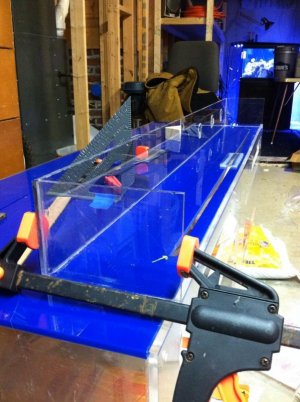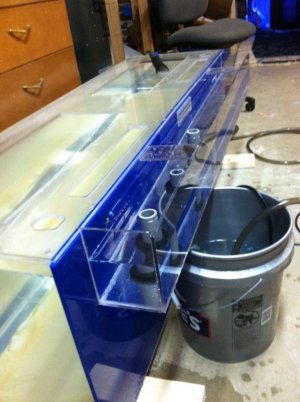Floyd R Turbo
Either busy or sleeping
Safety Precautions and Temperature
Safety Precautions and Temperature
James, and anyone else who knows, I have some questions.
First, related to safety. I have noticed that the worst smelling procedures are not the solvent welding (except for the acetic acid smell) but rather cutting and routing, in particular flush trimming and routing teeth are particularly noxious. I got hold of a top-of-the-line respirator, as well as some chemical cartridges. What I noticed is that I don't smell a thing while wearing the respirator, and the second I take it off I can smell that smell and woo hoo does it smell. This tells me that I made the right choice in getting the respirator. Is there a particular cartridge (brand or type) that should be used? I'm pretty sure I got the right one, because the smell is gone, but I suppose that doesn't mean everything is getting filtered out.
Second, I live in a cold winter climate. Today when I got up, it was 27F. Supposed to get a snowstorm on Monday. I currently do everything in the garage, so old man winter showing up is screwing up my shop.
You have mention in this thread that ideally you like 75-80 temp and low humidity, and that colder weather makes for more brittle joints. I am wondering exactly how much of a concern this should be. I have AA to add in, so I can slow the bonding time to compensate. Does this mostly resolve the potential problem, or is there a minimum temperature that needs to be maintained no matter what?
Lastly, combining these two, I am currently looking into space heating. The wife's Dad gave us one of these portable electric fireplaces (not just a cheapo plastic space heater - this one is really nice, but we have no place for it - yet) that uses little energy but gives off a lot of heat. My concern is that any heating technique in conjunction with whatever is offgassing from cutting/routing/welding would potentially increase some kind of health and/or safety issue. Are the gasses release something that could be flammable, or made worse if passed over a heating element, even a low-power one?
I will probably be installing some kind of exhaust vent and fresh air intake system at some point, but I wanted to hear input on this anyways.
Safety Precautions and Temperature
James, and anyone else who knows, I have some questions.
First, related to safety. I have noticed that the worst smelling procedures are not the solvent welding (except for the acetic acid smell) but rather cutting and routing, in particular flush trimming and routing teeth are particularly noxious. I got hold of a top-of-the-line respirator, as well as some chemical cartridges. What I noticed is that I don't smell a thing while wearing the respirator, and the second I take it off I can smell that smell and woo hoo does it smell. This tells me that I made the right choice in getting the respirator. Is there a particular cartridge (brand or type) that should be used? I'm pretty sure I got the right one, because the smell is gone, but I suppose that doesn't mean everything is getting filtered out.
Second, I live in a cold winter climate. Today when I got up, it was 27F. Supposed to get a snowstorm on Monday. I currently do everything in the garage, so old man winter showing up is screwing up my shop.
You have mention in this thread that ideally you like 75-80 temp and low humidity, and that colder weather makes for more brittle joints. I am wondering exactly how much of a concern this should be. I have AA to add in, so I can slow the bonding time to compensate. Does this mostly resolve the potential problem, or is there a minimum temperature that needs to be maintained no matter what?
Lastly, combining these two, I am currently looking into space heating. The wife's Dad gave us one of these portable electric fireplaces (not just a cheapo plastic space heater - this one is really nice, but we have no place for it - yet) that uses little energy but gives off a lot of heat. My concern is that any heating technique in conjunction with whatever is offgassing from cutting/routing/welding would potentially increase some kind of health and/or safety issue. Are the gasses release something that could be flammable, or made worse if passed over a heating element, even a low-power one?
I will probably be installing some kind of exhaust vent and fresh air intake system at some point, but I wanted to hear input on this anyways.



